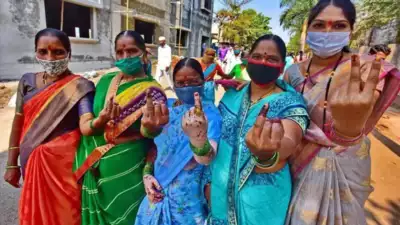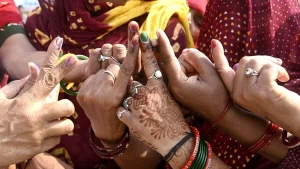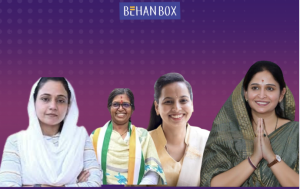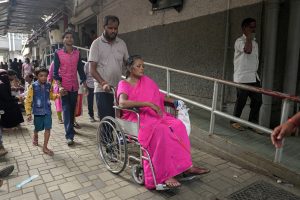Inflation, Unemployment, Women’s Rights: Maharashtra Assembly Says ‘Maybe Later!’
The 14th Maharashtra Assembly rammed through 1000 crucial resolutions in the last days but was visibly silent on crucial development issues
- Priyanka Tupe

The Maharashtra’s state legislature held 12 sessions and functioned for a total of 131 days during its tenure between 2019 to 2024 (till the budget session in March). Three sessions in 2020 were called off due to the covid pandemic. This is, on an average, 169 days less than the normally expected working days of a state legislature, says a report released by Sampark, a Mumbai based policy research and advocacy organisation.
The outgoing Maharashtra state government has been at the centre of intense political turmoil and drama which saw internal splits within two important parties- the Shiv Sena and the NCP leading to formation of the 3 different governments with different sets of alliance partners in a span of 5 years, creating instability in the state.
Some flagship schemes such as the Mukhyamanatri Mazi Ladki Bahin Yojana to provide financial assistance of Rs.1500 to women from lower income groups were also passed in the assembly. Notably, 1400 new decisions were rammed through in 10 days before the announcement of elections on October 15. These include land to the Adani group for the redevelopment of Dharavi and grants for different welfare boards for various communities.
Elections in the state are scheduled to be held on 20 November in a single phase. As part of our Feminist Election Newsroom, we will bring you a series of reports, ready reckoners and other information tools that bring you the state of play of India’s richest state.
Assembly and Its Efficiency: A Snapshot
In an assembly that met less than 40% of its normal functioning days, a total of 5921 questions were raised according to the Sampark study. Apart from the number of days, the study also looked at the number of questions raised by each MLA, district wise performance of legislators and issues raised in the assembly. It also compares the performance of the outgoing assembly with the previous assembly.
“The assembly working for 100 days annually is not a precedent but an unsaid norm. Even if we exclude 2 years of the Covid pandemic, 300 working days should have been ensured”, Mrunalini Jog, a program head at Samprak who worked on this study, told Behanbox. The previous assembly between 2014-2019 also functioned for only 199 days, suggesting the declining working days of the most crucial legislative process.
Among the 26 women MLAs who were part of the last assembly, Manisha Chaudhary (BJP) representing Dahisar (Mumbai suburban) asked the maximum questions (459). Pratibha Dhanorkar (INC) from Warora constituency of Chandrapur district raised the highest number of questions (316) among the first time MLAs.
“It is true that many MLAs who wanted to raise important questions in the assembly, didn’t get sufficient time as almost two years were consumed by the covid pandemic. However, the political turmoil also affected the functioning of the legislative committees”, said Mrunalini.
Legislative committees, like parliamentary committees, are responsible for addressing pressing issues through field visits, research, and contribution to policy interventions. These committees which comprise MLAs from various political parties can propose schemes and interventions to the government. In Maharashtra, these committees were reshuffled three times during the five-year term coinciding with the multiple changes in government.
The assembly did not discuss a single private member bill.
Inflation, A Non Issue
Maharashtra’s inflation rate is 6.2, higher than the national average of 5.65%. In the last 5 years, the cost of a vegetarian meal (thali), which does not include dairy products, has risen by 71% in the state, while people’s incomes rose by 37%. A single serving of 125 grams of toor dal which used to cost Rs. 9.3 now costs Rs.20.1.
Yet, only 10 questions were raised on the issue of inflation. These questions came from only 8 out of the 36 districts in the state.
“We have experienced upward pressure on the Consumer Price index for several years now. Poorly managed inflation, along with slow economic growth and employment generation has affected the poor and lower income class especially”, Savita Kulkarni, professor at the Gokhale institute of Politics and economics and researcher who works on multidimensional poverty told Behanbox. Inflation and unemployment were major concerns for voters, reported in the run up to the Loksabha election polls held between April and June 2024. A recent pre-poll Lokniti survey conducted by the Centre for Study in Developing Societies (CSDS) ahead of elections in Maharashtra also noted that inflation as a pressing issue for the voters.
During the general elections between April and June, Behanbox had, in a series of first person accounts, looked at inflation and its impact on women.
While some causes of inflation, especially international events like the Russia-Ukraine war, unpredictable climate and pandemic related shocks are beyond control, short term measures such as reasonable tax rates, cess on petroleum products or responsive export-import management policies have the potential to to check price rise, says Kulkarni.
India ranks 105 in Global Hunger Index 2024, labelled as ‘serious’. By UNICEF’s definition, 40% of India’s children experience severe child food poverty with less dietary diversity in their daily food consumption. Undernutrition among children, men and women was the highest contributing factor among the multiple deprivations that Indian households faced in 2015-16 as well as in 2019-21 as per NITI Aayog’s report on multidimensional poverty index.
Other than the inflation, an average 2 questions per district were raised on vital issues like food, ration, nutrition, mid-day meals, and employment guarantees in the assembly in the past five years. The report found that only 2% of questions raised are related to the human development index in this assembly.
“We also provide questions and inputs to the MLAs prior to every assembly session and send them a piece of information every month especially on the issues of women, children, and health.” said Mrunalini.
In a district like Nandurbar, which has the lowest Human Development Index (HDI) in the state, not a single question was raised about nutrition. Only one question was about Anganwadis, one about rations and one about employment guarantee, 2 questions about food and 0 questions about inflation were asked in the assembly. No questions were raised about the mid-day meal scheme either. Nandurbar has severe issues related to maternal mortality rates, malnutrition, sickle cell anemia, public health infrastructure, employment, and basic amenities. As a tribal-dominated district, it also has numerous issues related to the education of tribal children, especially in ashram schools and the facilities provided there.
Women and Work
Questions on the issues related to women were doubled in the 14th assembly from the last one, while those related to children nearly halved.
Violence against women and children was a predominant question across the districts. ‘Protection of children from sexual offences’, timely grant allocation to ensure juvenile justice, malpractices and need of audits at children homes (for children with the conflict of law or rescued children from crisis) were also raised.
“However questions on violence against women n the assembly were topical ones instead of nuanced discussions. MLA’s didn’t ask questions about how there can be a long term processes for curbing violence against women.” said Mrunalini Jog. One such was the questions about 1000 young girls missing from Yavatmal and Buldhana districts. There were some questions on schemes like the Pandita Rambai Vyajmafi Yojana (a scheme that was meant to assist single women facing challenges in covid pandemic).
There were no specific questions on women and their employment- unemployment rates,salaries and wages and safe workspaces. Beed district which has been in the news for hysterectomies of cane cutters was discussed in the assembly but it did not feature the most important issues of social security benefits, workplace security, cost of maternal health and rising debts of cane cutters. Behanbox had been reporting on women cane cutters consistently. The issues of residential hostels for children of cane cutters were discussed in assembly.
Women’s daily wage rates have been lowered in Maharashtra as compared to Bihar. Women in rural Maharashtra get an average of Rs 220 as daily wage, whereas women in rural Bihar earn Rs 250. 32 % women are engaged in daily wage professions, 19 % women are self employed who earn an average Rs 11,000 to 12,000 a month, according to the recent periodic labour force survey. Behanbox had earlier reported how the National rural employment guarantee scheme is yet to reach the most marginalised women in Maharashtra. None of these issues were raised by the MLAs of the concerned districts of Amravati, Akola and Yavatmal.
Health
While the number of questions on health increased by 2% in this assembly, a total of 451 questions (7.5 % of all questions) raised were about health. But some of the crucial questions were ignored. One of them being the incident in Nanded’s Shankarrao Chavhan government medical college and hospital in October 2023 which claimed more than 72 lives in a public health crisis.Behanbox reported from the ground on maternal and child deaths at this government hospital. The issue was raised in the state assembly in November 2022, a full year before the tragedy, which was not addressed by the government. While demanding for a super speciality treatment facility, the starred question also raised concerns about the lack of capacity to provide the necessary healthcare for patients from Nanded as well as the adjoining districts of Parbhani, Hingoli, Yavatmal. The 100 beds in the maternity department were also insufficient.
Exclusion of Transgender Persons
There was not a single question asked in the assembly about the issues of trans persons in the state, per the Sampark report. Trans women have been excluded from the flagship schemes for women like Mahila Sanman Yojana and Mukhyamantri mazi ladaki bahin yoajana. There was no budget allocation for the Transgender’s Welfare Board in Maharashtra in the 2024 budget. The transgender welfare board was set up in 2019 during the tenure of the Mahavikas Aghadi government led by Uddhav Thackeray and received an initial fund of Rs. 5 crore.
We believe everyone deserves equal access to accurate news. Support from our readers enables us to keep our journalism open and free for everyone, all over the world.




